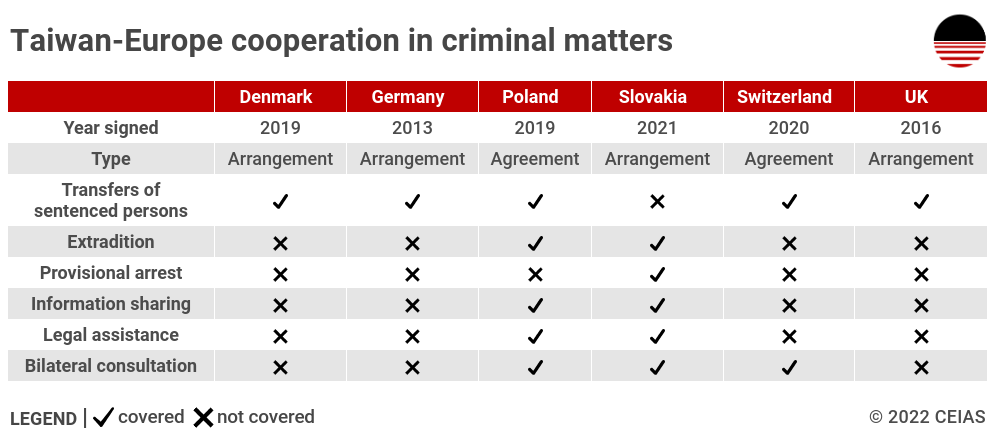New interest in developing relations with Taiwan has opened non-commercial areas to improve cooperation. Extraditions and legal cooperation in criminal matters have emerged as a new frontier for Taiwan-Europe relations. For a more robust relationship, Taiwan and Europe should strive to include the civil and commercial dimensions in their negotiations on legal cooperation.
In the summer of 2021, Taiwan and Slovakia signed an Arrangement on Judicial Cooperation in Criminal Matters. While the news went rather unnoticed in Slovakia (and Europe in general), in Taiwan it raised considerable interest in local media. That was to be expected. Taiwan’s international maneuvering space is increasingly under pressure from neighboring China, and signing an agreement on judicial cooperation in criminal matters, a politically sensitive area, was a welcome development proving that Taiwan’s outreach toward Central and Eastern Europe (CEE) can help to improve its international standing.
A press release by the Taiwanese Ministry of Justice made available shortly after the signing ceremony stated that the deal signed with Slovakia was the “sixth such agreement to be inked with a European country, following the five other European countries: Germany, the U.K., Poland, Denmark, and Switzerland.”
However, closer analysis of the contents of the six agreements reveals significant differences in their scope. The two (and quite broad) deals signed with Slovakia and Poland can serve as models for Taiwan in pursuing more agreements with European nations. The remaining four agreements offer only a limited room for mutual cooperation in matters related to criminal law.
What’s the deal with criminal cooperation deals?
A relatively broad range of subjects can be put under the heading of cooperation in criminal matters. It can include basic information sharing and legal assistance (e.g. serving of documents, collection of evidence, etc.), as well as more sensitive issues, such as detention, extradition of indicted persons, and transfer of convicts already serving their sentences.
Naturally, extraditions tend to attract the most attention as they have the most visible implications for the contracting parties’ sovereignty, with the extraditing state ceding its jurisdiction and authority to set its criminal policy and pursue criminal proceedings in favor of the requesting state.
Certain caveats need to be considered to understand the mechanics in which extradition works. First, as an exercise of sovereignty, countries may extradite under domestic laws even when an extradition treaty has not been signed with the requestor. Second, the conclusion of an extradition treaty limits the states’ sovereign right to refuse extradition. Third, even when an extradition agreement is concluded, under international human rights law states are not allowed to extradite in cases of political crimes or in which there is potential for breach of the non-refoulment principle (danger of torture, cruel and inhuman treatment, death penalty). Fourth, in the case extradition to more than one state is possible and permissible, the extraditing state has the sovereign right to decide which requesting state it will prefer.
In the case of Taiwan, concluding criminal cooperation agreements has a highly relevant human rights dimension due to the persisting problem of extraditing Taiwanese nationals to China and fears of subjecting them to arbitrary proceedings, as well as torture or the death penalty.
In 2019, Czechia considered the extradition of eight Taiwanese nationals to China. The Court of Appeal decided that extradition was permissible as China gave diplomatic assurances that it will refrain from capital punishment. Nevertheless, the extraditions were at a later stage stopped by a Constitutional Court ruling that the Court of Appeal’s judgment was contrary to Czech Constitution and European Convention on Human Rights, with the Ministry of Interior even offering asylum protection to the Taiwanese nationals.
The same year, Spain extradited 94 Taiwanese citizens to China to face prosecution. The Spanish case is particularly instructive when explaining Taiwan’s motivation to conclude extradition agreements (and other types of criminal matters cooperation deals) with European states. Both Taiwan and China requested the extradition. Spanish courts ended up giving preference to the Chinese request due to having formalized diplomatic relations and a binding extradition treaty with China, both of which Taiwan lacks.
Taiwan-Europe judicial cooperation: progress report
As was already mentioned, Taiwan has tried to conclude legal cooperation agreements with several European countries to secure its interests and prevent extraditions to China. The degree to which it has been successful, so far, is largely dependent on the scope of the signed agreements.
Upon analysis of the six agreements mentioned in the Ministry of Justice press release, we have identified six main areas that they cover: transfers of sentenced persons, extraditions, provisional arrests, information sharing, legal assistance, and bilateral consultations.
Among the six analyzed agreements, the earliest one was signed by Germany, in 2013. The UK followed three years later, then Denmark and Poland in 2019. In 2020, Switzerland joined the club. Slovakia is the latest addition as of 2021.

The way these deals are labeled has a symbolic value. Of the six countries, two (Poland and Switzerland) consented to use the label “Agreement” in the title. The remaining four opted to use the less politically charged term “Arrangement,” which is deemed not to imply Taiwanese sovereignty as strongly as the “Agreement” or “Treaty” label, while being higher in the hierarchy of international deal-making than a mere “Memorandum.”
As a matter of practicality, the actual content of these deals is far more relevant than their labels. Here, we can observe stark differences. Only Poland and Slovakia, both latter additions to the group, have concluded a broad spectrum agreement covering more legal cooperation areas.
When it comes to Germany, Denmark, Switzerland, and the UK, these are single-issue agreements that deal only with transfers of sentenced persons. Compared to extraditions, this is a politically less sensitive area of cooperation, as the parties do not cede their authority to adjudicate criminal cases but rather cooperate in the execution of the final criminal judgment.
Further, these agreements do not provide mutual aid in the investigation process. This makes solving transnational crime much more complicated, as police and prosecutors are unable to rely on evidence that could be potentially obtained from the other country.
Even though each of these countries could do so under their own domestic laws, the Spanish case suggests that Taiwan can derive only limited benefits for itself from these four agreements.
Poland and Slovakia: broad spectrum legal cooperation
The Polish-Taiwanese Agreement on the Legal Cooperation in Criminal Matters and the Slovak-Taiwanese Arrangement on Judicial Cooperation in Criminal Matters were concluded later, compared to most of the other four agreements. In both cases, the conclusion came at a time of increased political interest in developing relations with Taiwan beyond the existing status quo.
Still, substantial differences exist between them. Unlike the Polish deal, Slovakia has not explicitly included transfers of sentenced persons in its agreement with Taiwan, though it could be argued that this is implied in the extradition; this is still permissible under Slovakia’s domestic law.
On the other hand, provisional arrests are lacking in the Polish agreement but are included in the Slovak one. This is potentially a problematic omission, as provisional arrests serve an important function in the extradition process; arresting and detaining the person who is considered for extradition prior to the actual extradition procedure is resolved, thus preventing that person from potentially fleeing the country elsewhere, rendering the entire extradition process obsolete.
Another crucial difference between the two agreements lies in the level of specificity of the obligation to provide mutual legal assistance. The Slovakia agreement merely includes a general obligation to assist, while deferring to national laws in defining the scope of assistance. By comparison, the Poland agreement exhibits a more granular approach, including a list of specific actions covered under the legal assistance. Taking of witness testimonies, transmission and serving of documents, searches and seizures, on-site examinations, and even asset forfeitures are explicitly covered. This gives the two sides a higher degree of legal certainty as to what actions will be executed under the legal assistance obligation.
What’s next?
While both the Polish and Slovak agreements could be improved, together they have the potential to serve as models for future deal-making on criminal law-related matters with other European countries. A natural next step would be to conclude similar agreements with Czechia and Lithuania, two countries that have recently emerged as the most outspoken supporters of Taiwan in Europe.
Continuing use of the death penalty in Taiwan is among the factors that may currently dissuade the conclusion of these agreements with more European countries. However, capital punishment enjoys a high degree of popular support (a 2014 survey revealed that over 80% of Taiwanese are against the death penalty abolishment) and its abolishment is not yet in sight.
Until such time, any potential extraditions to Taiwan will have to rely on the established practice of diplomatic assurances. Including specific ‘anti-capital punishment’ safeguards in the agreements would also be advisable, even when they already exist in the European national laws. Among the six analyzed agreements, only the Germany-Taiwan Arrangement on Transfer of Sentenced Persons contains explicit safeguards against the use of capital punishment.
At the same time, European nations should also pursue legal cooperation with Taiwan in areas beyond criminal law. So far, Slovakia has been the first and only European country to conclude an agreement that deals with judicial cooperation in civil and commercial matters with Taiwan.
Improved contract enforcement and better access to other legal remedies are worthwhile contributions toward ease of doing international business. Next to free trade and investment agreements, improving the legal certainty of the civil and commercial relationships is an essential step toward removing existing trade hurdles.
Unlike the former two, the conclusion of civil legal assistance agreements is entirely in the competence of EU member states. At the same time, unlike criminal legal cooperation, civil legal cooperation is less politically controversial, as it has a direct link to trade relations with Taiwan, thus being much easier justifiable under the European countries’ “One-China” policies. Thus, including the civil dimension in negotiations about new legal cooperation agreements could be an important win for the development of EU-Taiwan relations that can be obtained at little cost.
This article benefited from research assistance from Yiju Chen, CEIAS Research Assistant.
This article is published under the auspices of the CEIAS Center for CEE-Taiwan Relations.







